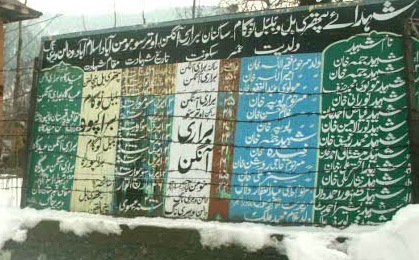Newspaper Article 15/11/2016
Since ages, the United States (US) has long been supportive of human rights, democracy, and rule of law around the world. The US has always regarded its values, i.e. human rights, democracy, and rule of law as beacon of hope for the world’s marginalized communities. These were the core values, among other things, that helped the US defeat former Soviet Union and become the sole super power. But it is very unfortunate to see the US silence over Kashmir carnage and gross human rights violations by India since last thirty years. The Kashmir issue is not only a political issue but also a human issue where countless innocent persons have been targeted by pellet guns. The US silence and that too by the sole super power is meaningful. The Indo-US honeymoon has brought more complications to the Kashmir issue as people of Kashmir have started losing hope not only from the sole super power but also from the major states led or influenced by the US, which claim to be the biggest supporters of democracy and human rights in the world.
The US has been treading carefully while commenting on Kashmir issue largely owing to its economic and strategic interests with India lately. There have seldom been any blueprints of a solution that emerged from the successive US administrations and almost all administrations tried to play “quiet diplomacy” on the Kashmir. However, the US does realize the magnitude of the issue between the two nuclear powers. But the fact is even today we witness the traditional policy of the US on Kashmir being a problem, which both Pakistan and India need to resolve themselves and the US would facilitate any such move. This is ambiguous and hazy policy of the US, which never serves the just cause of the Kashmiris. The recent trends in the US show that it rather wants to be neutral on Kashmir issue and that too in India’s favour, which is not expected from the sole super power as being the sole super power it cannot remain neutral in world affairs, especially where the UN resolutions have already been there. Also, the US must understand that Kashmir issue has moved from the territorial dispute to humanitarian issue. The freedom movement of Kashmiris has never fizzled out completely keeping in view the recent wave of protests against the Indian occupation. This must be understood by international community.
The international media has been naïve in reporting the Kashmir issue. The term “militant’s death” and “separatist’s death” triggering violence is unfair as Kashmiris are fighting for their freedom and should be called freedom fighters instead. The position of the US in resolving the issues of the world has become limited in recent times. The traditional partners of the US in Europe are getting frustrated when it could hardly do anything when it came to issues like Crimean and Ukraine. Moreover, the US unipolarity has been challenged, if not ended, in Asia. The phenomenal rise of China coupled with resurgence of Russia has started giving trend that Asia’s issues must be resolved by Asia’s very own security architecture. If the US is unable to play its role in resolving the Kashmir issue, the simmering feeling that the US inability has become reality would get further momentum in Asia.
Now since the sole super power refuses to even speak or comment on the Kashmir issue during weekly press briefings, the global community must pay heed following three months of persistent killing and a great many instances of wounds because of the utilization of inhuman weapons, i.e. pellet guns. There have for long been witnesses of torment and arbitrary confinement by Indian security forces amid the conflict. In 2010 too, leaked “diplomatic cables” uncovered a presentation by the International Committee of the Red Cross to US authorities that pointed the gross misuse and abuses of Kashmiris in confinement cells, which Indian armed forces kept running in addition by local police and paramilitaries. In 2015 “Amnesty International’s research over a number of years has repeatedly uncovered patterns of impunity, including unlawful government orders to the police not to register complaints of human rights violations against the security forces.”
Also, India has recently rejected the UN Human Rights Council (UNHRC) request to visit Kashmir to probe human rights violations by Indian forces. Police in Indian-held Kashmir (IHK) have detained a prominent human rights activist, Khurram Parvez, spokesperson of Jammu and Kashmir Coalition of Civil Societies (JKCCS), and was prevented from leaving India to attend the ongoing session of the UNHCR in Geneva. The UN General Assembly session coincides with human rights violations in IHK and Pakistan must use this forum to highlight the issue.
Note: The article was carried by Pakistan Observer on September 25, 2016.
Disclaimer: Views expressed are of the writer and are not necessarily reflective of IPRI policy.

